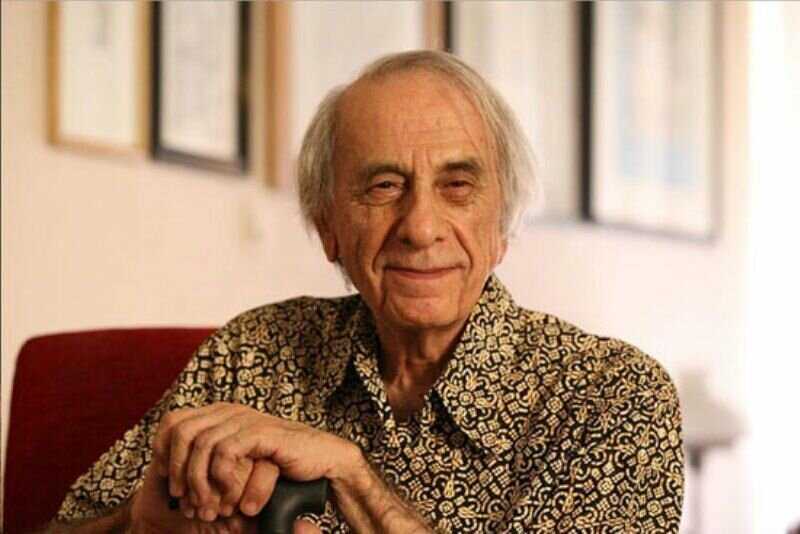As persistent as a diamond
Jalal Tehrani:
Naturally, the subject of culture will be the main focus of our interview. But before that - to examine the formation of your life - you have to go back many years.
That is, the years when you became a student via your scholarship and went to Switzerland. There, you saw many of the incredible minds of your time up close. From Charlie Chaplin to Gaston Bachelard. From Henry Corbin to Ernest Ansermet. Tell us about that time first.
Gaston Bachelard. From Henry Corbin to Ernest Ansermet. Tell us about that time first.
Jalal Sattari:
During the tactician time, I was accepted in the exam and went to Europe.
The sixth graders of 1329 - the same year I graduated - all took the nation-wide exam and the selected were sent to study abroad.
They took the exam at the Dar-ol-fonun academy. For the two majors of medicine and literature. After a while, the list of those who were accepted were put up on the wall in Ekbatan, and we went and saw that we had been accepted.
Jalal Tehrani:
What was your image of Europe before you left?
Jalal Sattari:
Europe was truly a dream for us. All Iranians knew very little about abroad. I had only heard a little about Europe from my French teacher. We left the country with a blank mind.
My first teacher was Jean Piaget. I had only seen Piaget's name in Ali Akbar Siyasi's book.it was there that we realized what a genius Piaget is. It was there that I realized how far we are from the important gifts of the world. There was a deep difference between what was called “psychology” in Iran and what was known by the same name in the rest of the world. I changed in Europe. I was not fascinated by the West at all; I did not follow the etiquette and principles there either. But i was very influenced by science.
Before going there, Switzerland was just a postal card for me.
Jalal Tehrani:
Did you guess you would be accepted?
Jalal Sattari:
Not at all.
As a matter of fact, when my friend came over to give me the news that I had been accepted, I could not believe it. Until I went and saw my name. I had not even told my family that I had taken the exam; Because I was sure that if I was accepted, they would not send me. Then the reason they agreed to send me was that I got first place in the exam among all the participants. My father was an average wealthy employee. I just had good teachers at Dar-ol-fonun.
Jalal Tehrani:
Do you remember Piaget?
Jalal Sattari:
There was always a number of student notebooks on Piaget’s desk in the classroom that he had signed. I brought that booklet to Iran, which was unfortunately stolen from me by a member of the press!
Piaget always smoked a pipe in the classroom as he taught. Piaget spoke French with such a thick accent, that we didn’t understand him very well, but I had studied French for six years at Dar-ol-fonun. Henri Wallon and Jean Piaget had many huge disagreements.
These disagreements were very interesting to me and made me curious about many matters. Through this conflict, I became acquainted with many of the issues of the West. The year I graduated, Piaget was working on the topic of "visual perception." So he gave me the same subject for my project.
Jalal Tehrani:
What was the biggest influence of the Western culture on you?
Jalal Sattari:
Western culture made me liberal. Meaning I didn’t have blinded prejudice. I had repeatedly warned people in Switzerland that they don’t know the Iranian culture properly. They only know a little about the Arabic culture. Jung only mentions Zoroastrianism briefly in a book once. Nowadays Madonna has appeared and sings Khayyam for them. There were no such things at that time. I learned to work away from political orientations and opinions. Despite the fact that Ehsan Naraghi took me to the Tudeh Party there. The head of all these organizations in Europe, was Iraj Eskandari. Iraj Eskandari's wife,who was French, owned a magazine called The Middle East; Where Iraj would write the history of the Tudeh Party.
Jalal Tehrani:
What is the biggest difference between then and today’s society to you?
Jalal Sattari:
At that time, culture would dominate politics. Today is the opposite. Today, I think the reason that I love Iran, is because I had honest and true teachers.
My teachers were not liars. Torbati, my literature teacher who was the editor of The Polad newspaper, took me to the newspaper and would pay me to write articles. All the articles I wrote at the time were nonsense. But Torbati printed them regardless. He would buy me free books from bookstores. Well, this person was obviously a cultural person. They knew the hierarchy. Today, I tell young people who, for example, pick the subject of their thesis about Antonin Artaud, that it makes no sense.
We are still beginners in the theater world. Theater still means “Nooshin” for us. Teachers of our time would teach us culture, not politics.
one of my teachers was Saeed Nafisi. He never told us whether he supported the left wing or the right. He only talked about Ferdowsi. Majid Rahnama published an article about Aragon in the magazine “Pelk e Solh”, in which he compared Aragon to Rumi. This was an example of the primacy of culture over politics.
Jalal Tehrani:
Who are the people you remember from this time?
Jalal Sattari:
Abbas Parviz. Abbas Parviz taught us that you should know the history of Iran before you take a political side.
Hossein Masrour was the same. I still remember the articles I wrote that Masrour wrote its footnotes.
Today, ideology has taken over everything. That’s why it is said that ideology is the myth of the modern world. That's why I say that ideology is dangerous. Because they’re far from culture. If you have politics minus culture, you can advance and flourish, but to no avail. Every cultured politician should know who Ferdowsi is;
Who Khayyam is. For any political orientation, it is necessary to first know where Iran is.
The domination of ideology is not due to culture, but to politics. Culture makes us libertarian. Politics, makes up culture.
Jalal Tehrani:
Who did you admire in those days?
Jalal Sattari:
In any category…
I can name Dariush Shaygan and Davood Rashidi as my friends of that time. Manouchehr Shahnavaz too.
Other than them, I liked Jamalzadeh very much in my youth. I also visited him a lot in Switzerland. From the cultural people, I loved Jean Piaget and Gaston Bachelard.


